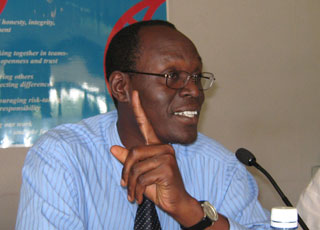
By Patrick Kagenda
The government is pushing for compulsory National Health Insurance policy amidst widespread public skepticism. The Independent’s Patrick Kagenda spoke to the World Bank’s Senior Health Specialist Peter Okwero who says it could take 15 years before tangible results are seen on the ground.
What is a National Insurance Policy?
There has been a lot of discussion on social health insurance and I think we need to first appreciate that social health insurance is a type of financing of the health sector. We have various financing methods, you can choose to use government taxation like Uganda currently does, you can also choose to pay out of pocket which currently Uganda does heavily and it is the number one social financing for health care or you can also choose to get support from partners or borrow for the same, which Uganda also does.
Close to 40% of money which we use for healthcare comes from out of pocket. Government contributes about 29% and the external partners contribute about 30%. Largely, most of the financing for health care comes from out of pocket. When we talk about social health insurance, the aim is to pool financial risks. You assume that when you fall sick, you are going to incur expenses. So you try to pool those risks together with an assumption that not every body falls sick every year. Out of 100 people 3 or 4 will fall sick and need the type of care which necessitates spending a lot of money. Essentially, that is the principle.
Is this a realistic policy option for Uganda?
There are very few countries at our level of income that have had very successful insurance schemes. The experience tends to show again; if you are going to have a social health insurance, then it takes you quite a number of years to put up the system and to gradually bring in people to the scheme. There are few countries that have been exhaustively studied in Asia, the best one being Thailand which started in 1974 when they launched their scheme and they have been gradually increasing on their catchment and it was in 2002 when they were able to say they are now covering 80% of the population. They started with the public sector, and they also had a different scheme for the private formal sector. And in 2002, they brought in what they call the informal sector. For Uganda’s case, it now depends on what you are looking at. The advice of World Bank when it had a mission with government in October 2007 was that this is going to be a protracted process. It is not going to take less than 15 years because the value of the social health insurance is on numbers. You have as many people as possible in the scheme. That is when you can raise substantial levels of funding and also when you can insure against all this financial risk. What we are witnessing from government is that first they should start with the public sector. Here, the whole idea is put the system in place, test it over 3-5 years then bring in another group of employees. But hopefully in the next 10-15 years, depending on how the scheme is managed and the reaction of the general population, it is achievable.
What are the risks involved in this scheme?
The biggest risk which government had to answer is the public sector that is going to meet the cost. You can not reduce people’s salaries without a plan. For the private sector, it is also going to be the same. How do make sure that they get maximum returns.For other countries that have taken on social insurance like Tanzania when they started; government forked the cost which essentially was like we pay, you maintain your salary and every thing as it is. Those are some of the options government will have to take.
What are the differences between social and private policies?
Private health insurance is purely driven on a profit motive. The whole idea of having a social health insurance is that you want to cover everyone. It is mandated by law. There is a very big difference to saying we want some few people who can afford. The Idea of social health insurance is that everybody should be able to access health services irrespective of whether they can afford. In Tanzania, they have defined these packages. The question is going to be how we make sure that the poor people access the services. In Tanzania, the poor are identified and the government pays for them.
 The Independent Uganda: You get the Truth we Pay the Price
The Independent Uganda: You get the Truth we Pay the Price



